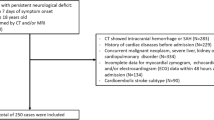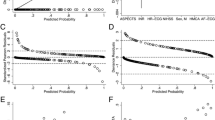Abstract
Introduction
This study aims to prospectively examine patients with ischemic wake-up stroke (WUS) presenting to the emergency department, to investigate the risk factors affecting the mortality occurring within 28, 90, and 180 days, and to create a new scoring system for the prediction of 28-day mortality.
Materials and method
Patients who presented to the emergency department with WUS findings between 01.07.2019 and 30.06.2020 were prospectively analyzed. Logistic regression analysis was performed to determine the factors affecting mortality and the modified Rankin scale (mRS).
Results
A total of 161 patients were included. Of the patients, 22.4% died within 28 days and 40.4% within 180 days. The presence of coronary artery disease (CAD) increased the 28-day mortality risk (p = 0.009) 3.57 times, 90-day mortality risk 2.15 times (p = 0.033), and 180-day mortality risk 2.18 times (p = 0.045). In order to be used in the prediction of 28-day mortality in patients with WUS, we developed the ischemic WUS mortality score (IWUSMOS), which consists of the middle cerebral artery (45 points), internal carotid artery (60 points), basilar artery (39 points), superior cerebellar artery (66 points) occlusion, hypertension (33 points), CAD (28 points), malignancy (100 points), and arrhythmia (23 points). With this scoring system, the 28-day mortality risk was determined as 0.05% when the total score was “43” whereas the mortality risk was found to be 95.0% when the total score was “187.”
Conclusion
We propose that IWUSMOS, a new scoring system, can be used to predict the 28-day mortality risk of patients with WUS.


Similar content being viewed by others
References
Malik P, Anwar A, Patel R, Patel U (2021) Expansion of the dimensions in the current management of acute ischemic stroke. J Neurol 268(9):3185–202. Epub 2020/05/22. https://doi.org/10.1007/s00415-020-09873-6. PubMed PMID: 32436103
Benjamin EJ, Blaha MJ, Chiuve SE, Cushman M, Das SR, Deo R et al (2017) Heart Disease and Stroke Statistics-2017 Update: A Report From the American Heart Association. Circulation 135(10):e146-e603. Epub 2017/01/27. https://doi.org/10.1161/cir.0000000000000485. PubMed PMID: 28122885; PubMed Central PMCID: PMCPMC5408160
Zhang YL, Zhang JF, Wang XX, Wang Y, Anderson CS, Wu YC (2021) Wake-up stroke: imaging-based diagnosis and recanalization therapy. J Neuro 268(11):4002–12. Epub 2020/07/17. https://doi.org/10.1007/s00415-020-10055-7. PubMed PMID: 32671526
Kim JS, Kim S, Lee SH, Lee HY, Lee SY, Im KB (2018) Increased Risk of Ischemic Stroke during Sleep in Apneic Patients. J Clin Neuro (Seoul, Korea). 14(2):174–8. Epub 2018/03/06. https://doi.org/10.3988/jcn.2018.14.2.174. PubMed PMID: 29504291; PubMed Central PMCID: PMCPMC5897199
Barreto PR, Diniz DLO, Lopes JP, Barroso MC, Daniele T, de Bruin PFC et al (2020) Obstructive Sleep Apnea and Wake-up Stroke - A 12 Months Prospective Longitudinal Study. Journal of stroke and cerebrovascular diseases : the Office J Nat Stroke Asso. 29(5):104564. Epub 2019/12/24. https://doi.org/10.1016/j.jstrokecerebrovasdis.2019.104564. PubMed PMID: 31866199
Peter-Derex L, Derex L (2019) Wake-up stroke: From pathophysiology to management. Sleep Med Rev 48:101212. Epub 2019/10/11. https://doi.org/10.1016/j.smrv.2019.101212. PubMed PMID: 31600679
Andrews NP, Gralnick HR, Merryman P, Vail M, Quyyumi AA (1996) Mechanisms underlying the morning increase in platelet aggregation: a flow cytometry study. J Am College Cardio 28(7):1789–95. Epub 1996/12/01. https://doi.org/10.1016/s0735-1097(96)00398-1. PubMed PMID: 8962568
Jiménez-Conde J, Ois A, Rodríguez-Campello A, Gomis M, Roquer J (2007) Does sleep protect against ischemic stroke? Less frequent ischemic strokes but more severe ones. J Neuro 254(6):782–8. Epub 2007/03/14. https://doi.org/10.1007/s00415-006-0438-y. PubMed PMID: 17351725
Turin TC, Kita Y, Rumana N, Nakamura Y, Takashima N, Ichikawa M et al (2013) Wake-up stroke: incidence, risk factors and outcome of acute stroke during sleep in a Japanese population. Takashima Stroke Registry 1988–2003. Eu Neuro 69(6):354–9. Epub 2013/05/03. https://doi.org/10.1159/000346124. PubMed PMID: 23635814
Zhang WY, Li Q, Zou N, Zhang G, Qin XY, Zhu C (2020) Clinical Characteristics and Functional Outcomes of Wake-Up Stroke in the Chinese Population. Eu Neuro 83(2):138–46. Epub 2020/06/04. https://doi.org/10.1159/000506198. PubMed PMID: 32492689
Kwon HS, Kim JY, Choi H, Lee SJ, Koh SH, Lee YJ et al (2017) Association between nocturnal blood pressure variation and wake-up ischemic stroke. Journal of clinical neuroscience : office J Neurosurg Soc Austral 44:210–3. Epub 2017/07/25. https://doi.org/10.1016/j.jocn.2017.06.066. PubMed PMID: 28734791
Tanimoto A, Mehndiratta P, Koo BB (2014) Characteristics of wake-up stroke. Journal of stroke and cerebrovascular diseases : the office J Nat Stroke Asso 23(6):1296–9. Epub 2013/12/24. https://doi.org/10.1016/j.jstrokecerebrovasdis.2013.10.021. PubMed PMID: 24361192
Caruso P, Naccarato M, Furlanis G, Ajčević M, Stragapede L, Ridolfi M et al (2018) Wake-up stroke and CT perfusion: effectiveness and safety of reperfusion therapy. Neurological sciences : official J Italian Neuro Soc Italian Soc Clin Neurophys 39(10):1705–12. Epub 2018/07/11. https://doi.org/10.1007/s10072-018-3486-z. PubMed PMID: 29987433
Park J, Yeo M, Kim J, Kim S, Lee SH, Kwon S et al (2020) Sleep-disordered breathing and wake-up stroke: a differential association depending on etiologic subtypes. Sleep Med 76:43–7. Epub 2020/10/23. https://doi.org/10.1016/j.sleep.2020.09.030. PubMed PMID: 33091725
Kim BJ, Lee SH, Shin CW, Ryu WS, Kim CK, Yoon BW (2011) Ischemic stroke during sleep: its association with worse early functional outcome. Stroke 42(7):1901–6. Epub 2011/05/07. https://doi.org/10.1161/strokeaha.110.602243. PubMed PMID: 21546480
Moradiya Y, Janjua N (2013) Presentation and outcomes of "wake-up strokes" in a large randomized stroke trial: analysis of data from the International Stroke Trial. Journal of stroke and cerebrovascular diseases : the Official J Nat Stroke Asso 22(8):e286–92. Epub 2012/09/04. https://doi.org/10.1016/j.jstrokecerebrovasdis.2012.07.016. PubMed PMID: 22939198
Dekker L, Hund H, Lemmens R, Boiten J, van den Wijngaard I (2017) Unknown onset ischemic strokes in patients last-seen-well >4.5 h: differences between wake-up and daytime-unwitnessed strokes. Acta Neuro Belgica 117(3):637–42. Epub 2017/08/15. https://doi.org/10.1007/s13760-017-0830-7. PubMed PMID: 28803427; PubMed Central PMCID: PMCPMC5565646
Alsahli K, Cheung AK, Wijesuriya N, Cordato D, Zagami AS, Wenderoth JD et al (2019) Thrombectomy in stroke of unknown onset, wake up stroke and late presentations: Australian experience from 2 comprehensive stroke centres. Journal of clinical neuroscience : official J Neurosurg Soc Australasia 59:136–40. Epub 2018/11/12. https://doi.org/10.1016/j.jocn.2018.10.114. PubMed PMID: 30414809
Author information
Authors and Affiliations
Corresponding author
Ethics declarations
Ethics approval and consent to participate
This study was carried out at the University of Health Sciences Turkey, Bursa Yuksek Ihtisas Training and Research Hospital, Department of Emergency Medicine, with the approval of the clinical research ethics committee of the same hospital with the protocol number 2011-KAEK-25–2019/06–13. All patients in the study have provided consent and patient anonymity has been preserved.
Conflict of interest
The authors declare no competing interests.
Additional information
Publisher's Note
Springer Nature remains neutral with regard to jurisdictional claims in published maps and institutional affiliations.
Rights and permissions
About this article
Cite this article
Yüksel, M., Kaya, H., Ay, M.O. et al. A prospective study of wake-up stroke patients presenting to the emergency department: a single-center cohort study. Ir J Med Sci 192, 409–416 (2023). https://doi.org/10.1007/s11845-022-02995-y
Received:
Accepted:
Published:
Issue Date:
DOI: https://doi.org/10.1007/s11845-022-02995-y




